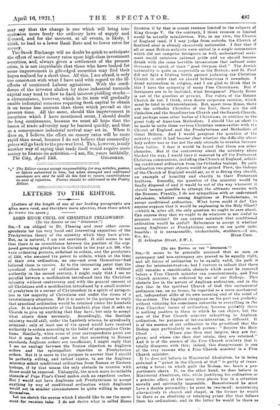LETTERS TO THE EDITOR.
[Letters of the length of one of our leading paragraphs are often more read, and therefore more effective, than those which jilt treble the space..I
LORD HUGH. CECIL ON CHRISTIAN FELLOWSHIP. CTo TILE EDITOR Or THE " SPECDITOR.'1 Sus,--I am obliged to Dr. Fleming and your other corre- spondents for the very lucid and interesting exposition of the Presbyterian theory of the ministry which they have given. But, .as is •oatural, I am not convinced. It still.eeems to me that there .is no resemblance between the position of .the sup- posed, overning presbyters in Corinth in the year A.D. 100, who were ordaining persons, ordained to ordain, and the presbyters of 1560. who assumed the_ power to ordain, which at the time of their own ordination, no one—not even themselves—had believed them to receive. As to the interesting point that the synodical character of ordination was set aside without authority in the second century, I might reply that I see no parallel between a modification introduced into the Christian ministry without controversy and with the general consent of all Christians and a modification introduced by a small number of presbyters in a corner of Christendom in a spirit of antagon- ism to the majority of Christians and under the stress of a revolutionary situation. But it is more to the purpose to reply that eynodioal ordination would be retained under the Lambeth plan. It is •characteristic of the Lambeth plan that, it asks no Church to give up anything that they have, but only to accept what others deem necessary. Accordingly, the Scottish ministry would still, under the. Lambeth scheme, be synodically ordained : only at least one of the synod would have received authority to ordain according to the belief of episcopalian Chris- tians. Similarly, when some of your correspondents point out that it may be retorted upon me that according to Roman standards Anglican orders are insufficient, I might reply that I see no analogy between the Roman objection to Anglican orders and the •episcopalian objection to .Presbyterian orders. But it is more to the purpose to answer that I should be perfectly willing, and indeed rejoice, to see the Anglican ministry solicit conditional ordination from Roman or Eastern bishops, it by that means the only obstacle to reunion with Rome could be removed. Unhappily, the.much more formidable obstacle:of Pope Pius's Creed .makes such an expedient useless. But I -would not have Anglicans ask Presbyterians to accept anything by way of conditional ordination which Anglicans would not in similar circumstances be quite willing to accept themselves.
Let ins sketch the course which I should like to see the move- anent for reunion take. I do not desire what is called Home
Reunion if by that is meant reunion limited to the subjects of King George V. On the contrary, I think reunion so limited would be actually mischievous. For, in .my view, the Church of England (and, if I may judge from outside, the Church of Scotland also) is already excessively nationalist. I fear that if all or most British subjects were united in a single communion which did not comprise foreigners as well, ecclesiastical senti- ment would reinforce national pride and we should become drunk with the same horrible intoxication that induced some Germans to speak of their " good German God." The Jewish nationality is quite as respectable as the British ; and St. Paul did not fight a lifelong battle against judaizing the Christian Church in order that we should britannicize it nowadays. I dread nationalism in religion, and I am glad to think that in this I have the sympathy of many Free Churchmen. But if foreigners are to be included, what foreigners? Plainly Rome is out of the question at present. The rulers of the Roman Church do not, I think, even desire corporate reunion, which must be fatal to ultramontanism. But, apart from Rome, there are the orthodox Churches of the East. there are the old Catholics, and the Scandinavian Church and the Danish Church, and perhaps some other bodies of Christians, in addition to the great body of American Methodists. I should like an effort to be made to unite these various Christian communities with the Church of England and the Presbyterians and Methodists of Great Britain. And I would postpone the question of the ministry until it had become clear whether the difficulty about holy orders was or was not the only obstacle to reunion between these bodies. I fear it would be found that there are other obstacles. But if the controversy about the ministry alone blocked the way. I would have it removed by all the Protestant Christian communions, including the Church of England, solicit- ing conditional ordination from the Orthodox bishops. By sueh ordination two great objects would be gained First, the bishops of the Church of England would set, as it is fitting they should, an example of humility and charity to their Protestant brethren. Secondly, the question of the ministry would be finally disposed of and it would be out of the way whenever it should become possible to attempt the ultimate reunion with the Romans. Frankly, I do not sympathies with or understand reluctance, whether among Anglicans or Presbyterians, to aocept conditional ordination. What harm could it do? Can anyone suppose that it would be unpleasing to the Holy Ghost? —which is, after all, the only question we ought to care about. Can anyone deny that we ought to do whatever is not sinful to promote reunion? Or can anyone maintain that conditional ordination would be sinful? Reluctance In accept it whether among Anglicans or Presbyterians seems to me quite inde- fensible : it is unreasonable, uncharitable, stubborn.—I am,


































 Previous page
Previous page